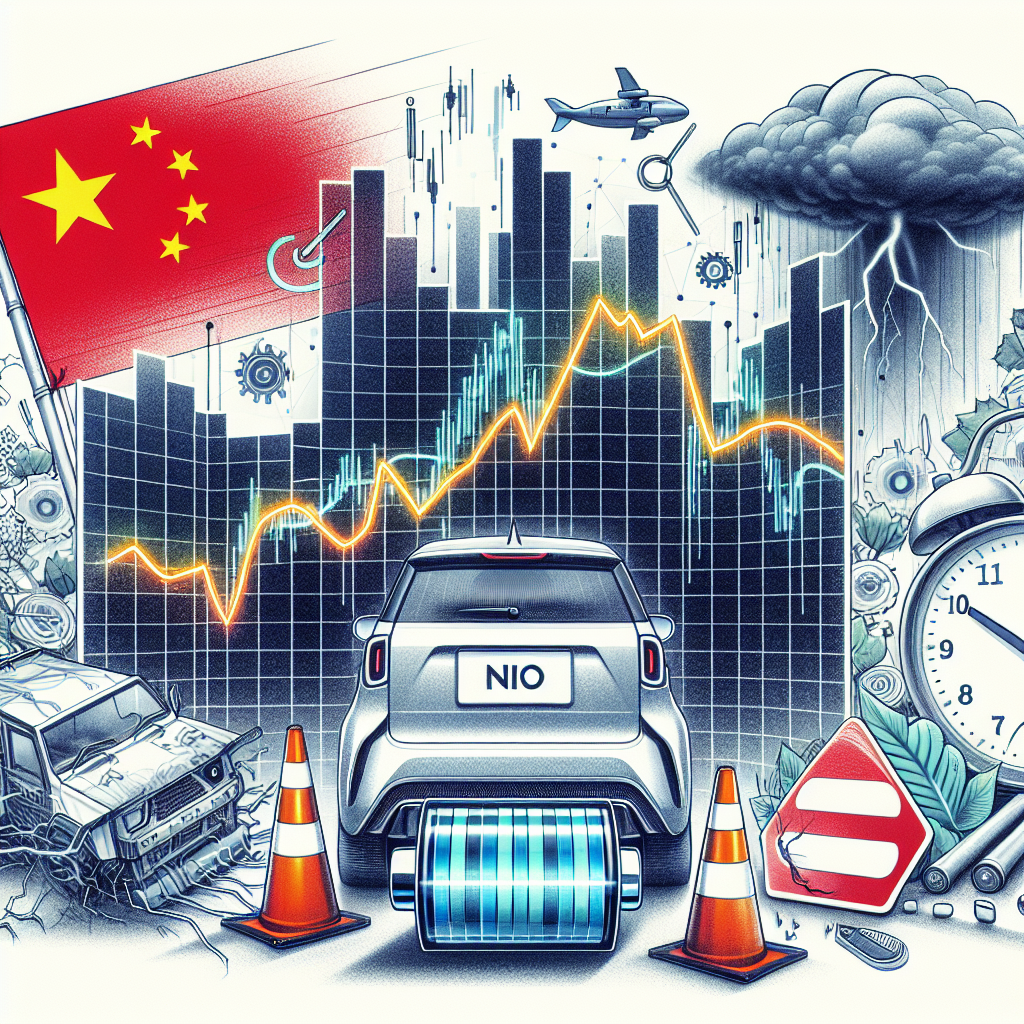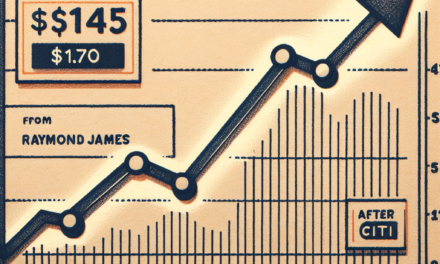“Nio’s Dip: Navigating Market Volatility and Investor Concerns”
Introduction
Nio Inc., the Chinese electric vehicle manufacturer, has experienced a notable decline in its stock value this week, drawing attention from investors and market analysts alike. Several factors have contributed to this downturn, reflecting both internal challenges and broader market dynamics. Key reasons include concerns over Nio’s production capabilities and supply chain disruptions, which have been exacerbated by ongoing global semiconductor shortages. Additionally, increased competition within the electric vehicle sector, particularly from domestic rivals and established global automakers, has intensified pressure on Nio’s market position. Investor sentiment has also been affected by macroeconomic factors, such as fluctuating economic conditions in China and regulatory scrutiny on technology and automotive sectors. These elements combined have led to a cautious outlook on Nio’s short-term performance, influencing the recent decline in its stock price.
Market Volatility Impacting Nio’s Stock Performance
This week, Nio Inc., the Chinese electric vehicle manufacturer, experienced a notable decline in its stock performance, a development that has caught the attention of investors and market analysts alike. Several factors have contributed to this downturn, with market volatility playing a significant role in shaping the trajectory of Nio’s stock. Understanding these elements is crucial for investors seeking to navigate the complexities of the current financial landscape.
To begin with, the broader market environment has been characterized by heightened volatility, which has had a ripple effect on individual stocks, including Nio. Global economic uncertainties, such as fluctuating interest rates and geopolitical tensions, have created an atmosphere of caution among investors. This cautious sentiment has led to increased market fluctuations, as investors react swiftly to new information and adjust their portfolios accordingly. In such a volatile environment, growth stocks like Nio are often more susceptible to sharp price movements, as their valuations are closely tied to future earnings potential, which can be difficult to predict in uncertain times.
Moreover, the electric vehicle sector, in which Nio operates, has been facing its own set of challenges. Despite the long-term growth prospects of the industry, short-term obstacles have emerged, impacting investor confidence. Supply chain disruptions, particularly in the semiconductor industry, have hindered production capabilities for many automakers, including Nio. These disruptions have led to delays in vehicle deliveries and have raised concerns about the company’s ability to meet its production targets. Consequently, investors have become wary of the potential impact on Nio’s revenue and profitability, contributing to the decline in its stock price.
In addition to these industry-specific challenges, Nio’s stock performance has also been influenced by company-specific developments. Recently, Nio reported its quarterly earnings, which, while showing growth, fell short of some analysts’ expectations. The company’s revenue and delivery figures, although improving, did not meet the high benchmarks set by the market, leading to a reassessment of its valuation. This earnings report, coupled with the broader market volatility, has prompted some investors to reevaluate their positions, resulting in selling pressure on Nio’s stock.
Furthermore, regulatory factors have also played a part in the recent decline of Nio’s stock. The Chinese government has been implementing stricter regulations on various sectors, including technology and automotive, as part of its broader economic policy agenda. These regulatory measures have created an additional layer of uncertainty for companies operating in China, including Nio. Investors are concerned about the potential implications of these regulations on Nio’s operations and growth prospects, which has contributed to the stock’s downward trajectory.
In conclusion, the decline in Nio’s stock this week can be attributed to a confluence of factors, with market volatility being a significant driver. The interplay between global economic uncertainties, industry-specific challenges, company-specific developments, and regulatory factors has created a complex environment for Nio and its investors. As the market continues to navigate these challenges, it remains essential for investors to stay informed and consider both the short-term risks and long-term opportunities associated with Nio’s stock. By doing so, they can make more informed decisions in an ever-evolving financial landscape.
Recent Financial Reports and Investor Reactions
Nio, the Chinese electric vehicle manufacturer, has recently experienced a notable decline in its stock value, prompting investors and market analysts to scrutinize the underlying causes. This downturn can be attributed to a confluence of factors, primarily stemming from the company’s recent financial reports and the subsequent reactions from investors. As Nio released its latest quarterly earnings, the figures revealed a mixed performance that has sparked concern among stakeholders. Although the company reported an increase in vehicle deliveries, the overall financial results fell short of market expectations, leading to a wave of investor apprehension.
One of the primary reasons for the stock’s decline is the company’s reported revenue, which, despite showing growth, did not meet the ambitious forecasts set by analysts. This shortfall in revenue can be attributed to several challenges that Nio is currently facing. For instance, the global semiconductor shortage has significantly impacted production capabilities, causing delays in vehicle manufacturing and delivery. Consequently, this has hindered Nio’s ability to capitalize on the growing demand for electric vehicles, thereby affecting its revenue generation.
Moreover, Nio’s profitability has been a focal point of concern. The company’s net loss for the quarter was larger than anticipated, raising questions about its ability to achieve sustainable profitability in the near future. This has been exacerbated by rising costs associated with research and development, as well as increased spending on marketing and expansion efforts. While these investments are crucial for long-term growth, they have placed additional pressure on the company’s financial performance in the short term.
In addition to these financial challenges, investor sentiment has been influenced by broader market dynamics. The electric vehicle sector, as a whole, has been experiencing heightened volatility, with fluctuating stock prices driven by changing market conditions and regulatory developments. For instance, recent policy shifts in China regarding subsidies for electric vehicles have created uncertainty, impacting investor confidence in companies like Nio that are heavily reliant on the Chinese market.
Furthermore, the competitive landscape in the electric vehicle industry is intensifying, with both established automakers and new entrants vying for market share. This increased competition has raised concerns about Nio’s ability to maintain its growth trajectory and defend its market position. As competitors continue to innovate and expand their offerings, Nio faces the challenge of differentiating itself and sustaining its appeal to consumers.
Despite these challenges, it is important to note that Nio remains committed to its strategic vision and long-term goals. The company has been actively working to address production bottlenecks and enhance its supply chain resilience. Additionally, Nio’s focus on technological innovation, such as advancements in battery technology and autonomous driving capabilities, underscores its commitment to staying at the forefront of the electric vehicle revolution.
In conclusion, the recent decline in Nio’s stock can be attributed to a combination of factors, including underwhelming financial results, market volatility, and increased competition. While these challenges have undoubtedly impacted investor sentiment, Nio’s strategic initiatives and commitment to innovation provide a foundation for potential recovery and growth. As the company navigates these complexities, it will be crucial for Nio to effectively communicate its progress and address investor concerns to restore confidence and stabilize its stock performance.
Global Supply Chain Disruptions Affecting Production
This week, Nio Inc., a prominent player in the electric vehicle (EV) market, experienced a notable decline in its stock value, a development that has captured the attention of investors and market analysts alike. One of the primary factors contributing to this downturn is the ongoing global supply chain disruptions, which have significantly impacted production capabilities across various industries, including the automotive sector. As the world continues to grapple with the aftermath of the COVID-19 pandemic, supply chain challenges have persisted, creating a ripple effect that has reached even the most innovative companies like Nio.
To understand the impact of these disruptions on Nio’s stock, it is essential to consider the broader context of the global supply chain crisis. The pandemic-induced lockdowns and restrictions led to a sudden halt in manufacturing activities worldwide, causing a backlog in the production and distribution of essential components. As economies began to reopen, the demand for goods surged, but the supply chain infrastructure struggled to keep pace. This imbalance has been exacerbated by labor shortages, port congestion, and transportation bottlenecks, all of which have contributed to delays and increased costs.
For Nio, these supply chain issues have manifested in several ways. Firstly, the company has faced difficulties in securing critical components, such as semiconductors, which are vital for the production of electric vehicles. The global chip shortage has been a significant hurdle for automakers, leading to production slowdowns and, in some cases, temporary factory shutdowns. Nio, like many of its peers, has had to navigate these challenges, which have inevitably affected its production output and delivery timelines.
Moreover, the rising costs associated with raw materials and logistics have put additional pressure on Nio’s profit margins. The increased expenses in procuring essential materials and transporting finished products have forced the company to reassess its pricing strategies and operational efficiencies. While Nio has made efforts to mitigate these impacts through strategic partnerships and supply chain diversification, the immediate effects on its financial performance have been unavoidable.
In addition to these operational challenges, investor sentiment has also played a role in the recent decline of Nio’s stock. The market’s reaction to supply chain disruptions is often swift, as investors anticipate potential impacts on a company’s earnings and growth prospects. In Nio’s case, concerns about its ability to meet production targets and maintain competitive advantage in the rapidly evolving EV market have contributed to a more cautious outlook among investors.
Furthermore, the broader economic environment has added another layer of complexity to the situation. Inflationary pressures and interest rate hikes have heightened market volatility, prompting investors to reevaluate their portfolios and shift towards more stable assets. This shift in investment strategy has not only affected Nio but also other high-growth technology and automotive stocks, as market participants seek to balance risk and reward in an uncertain economic landscape.
In conclusion, the decline in Nio’s stock this week can be attributed to a confluence of factors, with global supply chain disruptions playing a central role. As the company navigates these challenges, its ability to adapt and innovate will be crucial in maintaining investor confidence and sustaining its growth trajectory. While the road ahead may be fraught with obstacles, Nio’s commitment to overcoming these hurdles will ultimately determine its long-term success in the competitive EV market.
Regulatory Challenges in Key Markets

This week, Nio Inc., a prominent player in the electric vehicle (EV) market, experienced a notable decline in its stock value, a development that has captured the attention of investors and analysts alike. One of the primary factors contributing to this downturn is the regulatory challenges the company faces in key markets, which have raised concerns about its future growth prospects and operational stability. Understanding these regulatory hurdles is crucial for comprehending the broader implications for Nio and the EV industry as a whole.
To begin with, China’s evolving regulatory landscape poses significant challenges for Nio. As the company’s home market, China is critical to its success. However, recent government policies aimed at tightening regulations on technology and manufacturing sectors have created an environment of uncertainty. The Chinese government has been actively working to ensure that companies comply with stringent environmental standards and data security measures. For Nio, this means adapting to new regulations that may require substantial changes in its manufacturing processes and data management practices. Consequently, the potential costs and operational disruptions associated with these adjustments have made investors wary, contributing to the stock’s decline.
Moreover, Nio’s expansion into international markets has also encountered regulatory headwinds. In Europe, where the company has been making strides to establish a foothold, regulatory requirements related to vehicle safety, emissions, and consumer protection are particularly stringent. Navigating these complex regulations necessitates significant investments in compliance and adaptation, which can strain the company’s resources. Additionally, the European Union’s focus on promoting local EV manufacturers through subsidies and incentives presents a competitive challenge for Nio, as it must compete on an uneven playing field. These factors collectively contribute to investor apprehension regarding Nio’s ability to successfully penetrate and thrive in the European market.
In the United States, Nio faces a different set of regulatory challenges. The U.S. market is characterized by a complex web of federal and state regulations governing vehicle safety, emissions, and trade policies. Recent geopolitical tensions between the U.S. and China have further complicated matters, as they have led to increased scrutiny of Chinese companies operating in the American market. This scrutiny can result in delays in obtaining necessary approvals and certifications, thereby hindering Nio’s ability to introduce its vehicles to U.S. consumers in a timely manner. The uncertainty surrounding these regulatory processes has undoubtedly contributed to the recent decline in Nio’s stock value.
Furthermore, the global push towards stricter environmental regulations is another factor impacting Nio’s stock performance. As countries worldwide commit to reducing carbon emissions and transitioning to sustainable energy sources, the pressure on automakers to innovate and comply with new standards intensifies. For Nio, this means investing heavily in research and development to enhance the efficiency and sustainability of its vehicles. While these investments are essential for long-term success, they can strain the company’s financial resources in the short term, leading to concerns among investors about profitability and return on investment.
In conclusion, the decline in Nio’s stock this week can be attributed to a confluence of regulatory challenges in key markets. The company’s ability to navigate these hurdles will be crucial in determining its future trajectory. As Nio continues to adapt to evolving regulations in China, Europe, and the United States, its strategic decisions and investments will play a pivotal role in shaping its success in the competitive EV landscape. Investors and industry observers will undoubtedly be watching closely to see how Nio addresses these challenges and positions itself for sustainable growth in the years to come.
Competitive Pressures from Other EV Manufacturers
This week, Nio Inc., a prominent player in the electric vehicle (EV) market, experienced a notable decline in its stock value. A significant factor contributing to this downturn is the intensifying competitive pressures from other EV manufacturers. As the global demand for electric vehicles continues to surge, the market has become increasingly crowded with both established automakers and new entrants vying for a share of the pie. This heightened competition has placed considerable pressure on Nio, affecting investor confidence and, consequently, its stock performance.
To begin with, the EV market is witnessing rapid advancements and innovations, with companies like Tesla, BYD, and newcomers such as Rivian and Lucid Motors making significant strides. These companies are not only expanding their product lines but also enhancing their technological capabilities, which poses a direct challenge to Nio’s market position. For instance, Tesla’s continued dominance in the EV sector, bolstered by its robust infrastructure and brand loyalty, presents a formidable challenge for Nio. Moreover, Tesla’s aggressive pricing strategies and global expansion plans further exacerbate the competitive landscape, compelling Nio to reassess its strategies to maintain its market share.
In addition to Tesla, Chinese competitors such as BYD and Xpeng are also intensifying the competition. BYD, with its extensive range of electric vehicles and strong backing from the Chinese government, has been rapidly increasing its production capacity. This expansion allows BYD to offer competitive pricing, which can attract cost-conscious consumers away from Nio. Similarly, Xpeng’s focus on integrating cutting-edge technology, such as autonomous driving features, into its vehicles has garnered significant attention, drawing potential customers who prioritize innovation and advanced features.
Furthermore, the entry of new players like Rivian and Lucid Motors into the EV market adds another layer of competition. These companies have managed to capture the imagination of investors and consumers alike with their unique offerings and ambitious growth plans. Rivian, for example, has positioned itself as a leader in the electric truck and SUV segments, appealing to a niche market that Nio has yet to fully explore. Meanwhile, Lucid Motors has focused on the luxury EV segment, challenging Nio’s presence in the premium market with its high-performance vehicles and emphasis on luxury and comfort.
As these competitive pressures mount, Nio faces the challenge of differentiating itself in an increasingly saturated market. The company must continue to innovate and expand its product offerings to stay relevant. Additionally, Nio’s ability to scale production efficiently and manage supply chain constraints will be crucial in maintaining its competitive edge. The company must also focus on strengthening its brand presence and customer loyalty to withstand the pressures from its rivals.
In conclusion, the decline in Nio’s stock this week can be attributed to the growing competitive pressures from other EV manufacturers. As the market becomes more crowded with both established players and new entrants, Nio must navigate these challenges strategically to sustain its growth and reassure investors. By focusing on innovation, expanding its product range, and enhancing its brand value, Nio can work towards regaining its footing in the dynamic and rapidly evolving electric vehicle market.
Changes in Consumer Demand and Preferences
This week, Nio Inc., a prominent player in the electric vehicle (EV) market, experienced a notable decline in its stock value. Several factors have contributed to this downturn, with changes in consumer demand and preferences playing a significant role. Understanding these shifts is crucial for investors and industry observers seeking to comprehend the dynamics affecting Nio’s market performance.
To begin with, the electric vehicle industry is undergoing rapid transformation, driven by evolving consumer expectations and technological advancements. As consumers become more environmentally conscious, their preferences are shifting towards sustainable and energy-efficient transportation options. While this trend generally favors electric vehicle manufacturers like Nio, it also intensifies competition within the sector. Established automakers and new entrants are continuously innovating, offering a wider array of choices to consumers. Consequently, Nio faces the challenge of differentiating its products in a crowded market, which can impact its stock performance.
Moreover, consumer demand is increasingly influenced by economic factors, such as inflation and interest rates. Rising inflation can erode purchasing power, making consumers more cautious about large expenditures, including electric vehicles. Additionally, higher interest rates can increase the cost of financing vehicle purchases, potentially dampening demand. These economic pressures can lead to a slowdown in sales growth for companies like Nio, thereby affecting investor sentiment and stock prices.
In addition to economic considerations, consumer preferences are also shaped by technological advancements and innovation. The rapid pace of technological change in the EV industry means that consumers are constantly seeking the latest features and improvements. Nio must continuously invest in research and development to keep pace with these expectations. However, the substantial costs associated with innovation can strain financial resources, impacting profitability and, in turn, stock performance.
Furthermore, geopolitical factors and regulatory changes can influence consumer demand and preferences. For instance, government policies promoting or discouraging electric vehicle adoption can significantly impact market dynamics. In regions where subsidies or incentives for EVs are reduced or eliminated, consumer demand may decline, affecting sales for companies like Nio. Conversely, favorable policies can boost demand, but the uncertainty surrounding regulatory environments can create volatility in stock prices.
Another aspect to consider is the role of consumer sentiment and brand perception. Nio has built a strong brand identity, emphasizing luxury and cutting-edge technology. However, any negative publicity or perceived shortcomings in product quality can quickly alter consumer perceptions. In an age where information spreads rapidly through social media and online platforms, maintaining a positive brand image is crucial. Any missteps in this area can lead to a decline in consumer confidence, subsequently affecting stock performance.
In conclusion, the decline in Nio’s stock this week can be attributed to a complex interplay of factors related to changes in consumer demand and preferences. Economic conditions, technological advancements, regulatory environments, and brand perception all play pivotal roles in shaping consumer behavior. As the electric vehicle market continues to evolve, Nio must navigate these challenges to maintain its competitive edge and meet the expectations of increasingly discerning consumers. Investors and industry stakeholders will be closely monitoring how Nio adapts to these changes, as its ability to do so will be critical in determining its future market performance.
Analyst Downgrades and Their Influence on Stock Price
This week, Nio Inc., a prominent player in the electric vehicle (EV) market, experienced a notable decline in its stock price, a movement that has captured the attention of investors and analysts alike. One of the primary factors contributing to this downturn is the series of analyst downgrades that have recently emerged. These downgrades, often based on a combination of market conditions, company performance, and future outlook, can significantly influence investor sentiment and, consequently, stock prices.
To begin with, analyst downgrades are assessments made by financial experts who evaluate a company’s stock and provide recommendations to investors. These recommendations can range from “buy” to “hold” to “sell,” and they are based on a thorough analysis of the company’s financial health, market position, and growth prospects. When analysts downgrade a stock, it often signals to the market that there may be underlying issues or challenges that could impact the company’s future performance. In the case of Nio, several analysts have recently revised their ratings, moving from more optimistic positions to more cautious stances.
One reason for these downgrades is the increasing competition in the EV market. As more companies enter the space, Nio faces pressure to maintain its market share and continue its growth trajectory. Analysts have expressed concerns about Nio’s ability to differentiate itself in an increasingly crowded market, where established players and new entrants alike are vying for consumer attention. This competitive landscape has led some analysts to question whether Nio can sustain its previous growth rates, prompting them to adjust their stock ratings accordingly.
Moreover, macroeconomic factors have also played a role in influencing analyst opinions. The global economic environment, characterized by inflationary pressures and supply chain disruptions, has created challenges for many industries, including the automotive sector. For Nio, these challenges have manifested in the form of increased production costs and potential delays in vehicle deliveries. Analysts have taken these factors into account, leading to a more cautious outlook on the company’s near-term performance.
In addition to these external pressures, internal company dynamics have also contributed to the downgrades. Recent financial reports from Nio have shown mixed results, with some metrics falling short of market expectations. While the company has demonstrated strong revenue growth, concerns about profitability and cash flow have persisted. Analysts have highlighted these financial concerns as potential risks, further influencing their decision to downgrade the stock.
Furthermore, the broader stock market environment has also impacted Nio’s stock price. Investor sentiment has been volatile, with concerns about interest rate hikes and economic uncertainty leading to fluctuations in stock prices across various sectors. In such an environment, stocks perceived as riskier or more volatile, such as those in the EV sector, can experience sharper declines. Analyst downgrades can exacerbate these movements, as they often lead to increased selling pressure from investors seeking to mitigate risk.
In conclusion, the decline in Nio’s stock price this week can be attributed to a confluence of factors, with analyst downgrades playing a significant role. These downgrades, driven by competitive pressures, macroeconomic challenges, internal financial concerns, and broader market volatility, have influenced investor sentiment and contributed to the stock’s downward trajectory. As Nio navigates these challenges, the company’s ability to address these concerns and demonstrate resilience will be crucial in shaping future analyst assessments and investor confidence.
Q&A
1. **Question:** What impact did the broader market conditions have on Nio’s stock decline this week?
**Answer:** Broader market conditions, including concerns about rising interest rates and economic uncertainty, contributed to the decline in Nio’s stock as investors became more risk-averse.
2. **Question:** How did recent financial results affect Nio’s stock performance?
**Answer:** Nio’s recent financial results, which may have included lower-than-expected earnings or revenue, negatively impacted investor sentiment, leading to a decline in the stock price.
3. **Question:** What role did competition in the electric vehicle market play in Nio’s stock decline?
**Answer:** Increased competition in the electric vehicle market, particularly from established automakers and new entrants, raised concerns about Nio’s market share and growth prospects, contributing to the stock’s decline.
4. **Question:** Did any regulatory developments in China influence Nio’s stock this week?
**Answer:** Regulatory developments in China, such as new policies affecting the automotive or technology sectors, may have created uncertainty for Nio, impacting its stock negatively.
5. **Question:** How did supply chain issues affect Nio’s stock performance?
**Answer:** Ongoing supply chain disruptions, including shortages of critical components, likely hindered Nio’s production capabilities, leading to concerns about its ability to meet demand and affecting its stock price.
6. **Question:** Was there any significant insider trading activity that influenced Nio’s stock decline?
**Answer:** Reports of significant insider selling or changes in executive positions could have raised red flags for investors, contributing to the decline in Nio’s stock.
7. **Question:** Did geopolitical tensions have any impact on Nio’s stock this week?
**Answer:** Geopolitical tensions, particularly those involving China, may have heightened investor concerns about potential impacts on Nio’s operations and market access, leading to a decline in its stock price.
Conclusion
Nio’s stock decline this week can be attributed to several factors. Firstly, the company reported weaker-than-expected quarterly earnings, which raised concerns about its financial health and growth prospects. Additionally, broader market volatility, particularly in the tech and electric vehicle sectors, has contributed to investor apprehension. Supply chain disruptions and rising costs have also impacted Nio’s production capabilities, further dampening investor confidence. Lastly, increased competition in the electric vehicle market, both domestically in China and internationally, has put pressure on Nio’s market share and future growth potential. These combined elements have led to a decrease in investor confidence, resulting in the stock’s decline.





